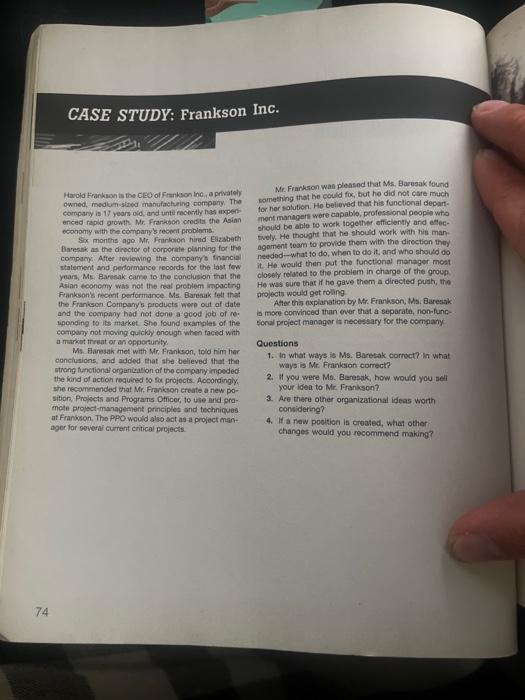question 2

Havola Frankaon is the cEO of Frankson ine, a privately owned, nodum sited manufacturing compory. The compary is 17 years old, and unti recertly has axpert: enced rapid growth. Mr. Frankion crodits the Asian economy with the company's cecent problems. Six months ago Mr. Frarkicon hired Elizsbeth Baresak as the diroctor of corporate planning for the company: After reviewing the comparys inancial. statement and perdarmance rocords for the last few years, Ms. Baresak came to the canclusion that the Asian tconemy was not the real problem impacting Fizanksons recent performance. Ms. Baresak, fett that the Frankson.Company's products were out af date and the company had not done a good lob of re. uponding to its market. She found axamples of the company oot moving quicky anough when faced with a market thruat or an opporturity. Ms. Banesak met with Mr, Frankson, told him har conclusions, and added that she believed that tha strong functional organization of the campary impeded the kind of action required to fox projects. Accordingly. she recommended that Mr. Frankion croate a new position, Projects and Programs Otficer, to sise aind promote project-maragement principlet and techniques at Frankson. The PPO would slso act as a project manager for oeverai curtent critical projects. Mr. Frankson wan pleased that Ms, Baresak found something that he could fox, but he did not care much for hor salution. Ho believed that his functional depart. ment managers were capable, professiondl peopie who ahould bo able to work together efficlently and etlecsvely. He thought that he should work with his man agoment team to provide them with the direction they needed - what to do, when to do it, and who should do it. He would then put tho functional manager most closely related to the problem in charge of the group He was sure that if ho gave them a directed push, the projects would get roling Ather this explanaticn by Mr. Frankson, Ms. Baresak is more convinced than ever that a separate, non-funcscral pecject managor it necessary for the company. Questions 1. In what ways is Ms. Baresak correct? in what ways is Mr. Franksion correct? 2. If you were Ma. Baresak, how would you sell your idea to Mr. Frankson? 3. Are there other onganizational ideas worth considering? 4. If a new poeition is created, what other changes would you recommend making








